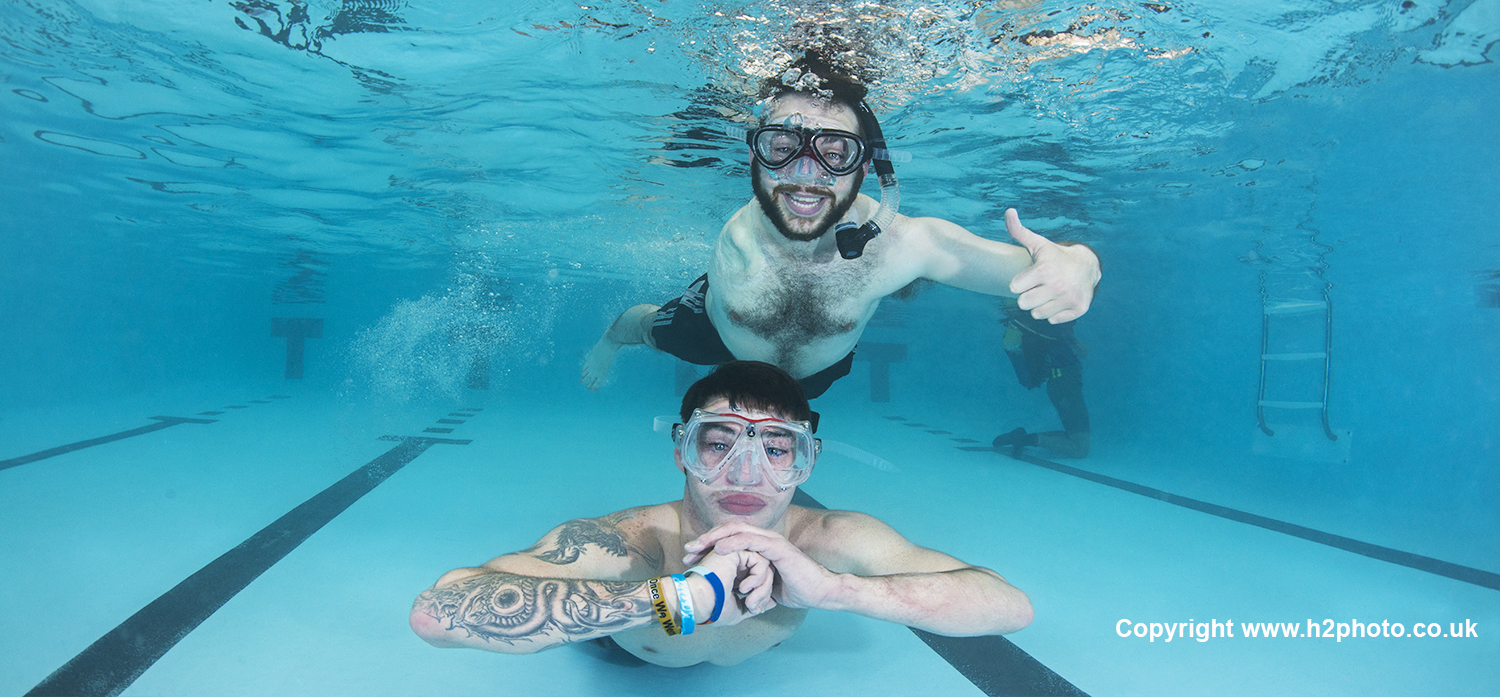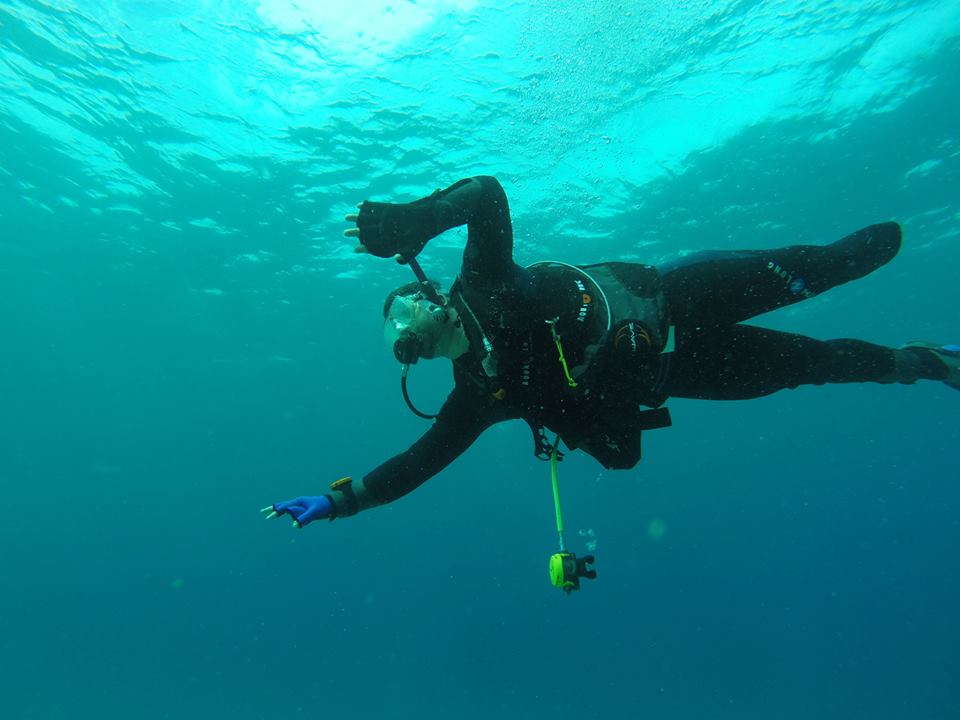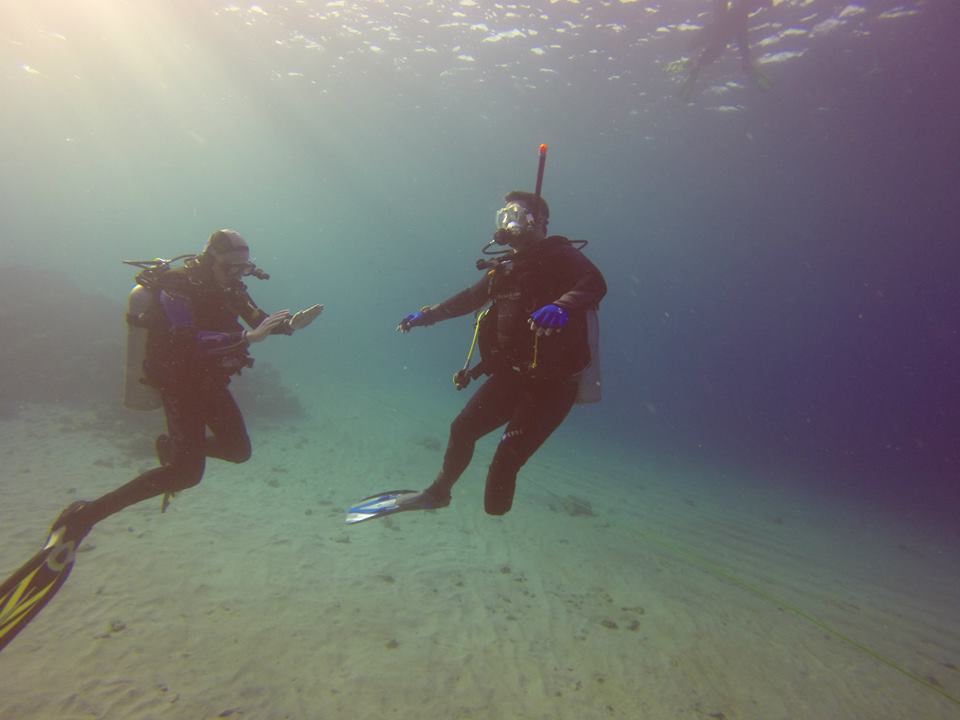News
Scuba Diving in Rehab

Last year, whilst taking part in the 2015 Miss Scuba UK competition, I had the pleasure of being introduced to Richard Cullen, the Chairman and life vice president of the charity ‘Deptherapy’, a charity that seeks to run specially adapted scuba diving programmes to aid seriously injured UK veterans.
I was introduced to veteran Danny Martin, who told me that on returning from Afghan, he was diagnosed with Stage 3 testicular cancer, which meant that he had to undergo lifesaving surgery to remove the affected cancer masses. After trying to cope with both the trauma of returning from war and a serious cancer diagnosis within months of each other, it’s not surprising that Danny was diagnosed with post traumatic stress disorder. In his words, “I went down a very dark road, turning mean, angry, and frustrated, and it got to a point where I was on the brink of losing everything, including my wife, my kids, and my house. I couldn’t take life any longer.”
The team at Deptherapy were alerted to the issues Danny was facing, and gave him round the clock help in the form of talking therapies for weeks on end. They offered Danny a trip to Egypt to complete a diving course, a sport that he had never tried before. He described the experience as life changing, and said that being under the water cleared his mind of the problems consistently running through his head.
I also met Chris Baker, a disabled Army Veteran who was injured by an IED in Iraq. He had sustained extensive and complicated injuries, and due to crippling pain and a state of mental collapse on realising he would never walk again (after previously living a very active lifestyle), he was confined to his bed for almost 5 years. I was shocked at the extent of Chris’s spinal injuries, and the horrendous mental health issues that both Danny and Chris had faced after returning from war, but after further reading I have discovered that they are certainly not alone.
The combination of modern warfare and modern medicine has led to a rise in injured veterans returning home. Between 2006 and 2013, a total of 6,663 UK personnel were aero-medically evacuated from Afghanistan on medical grounds (Gov.co.uk accessed December 15). This obviously represents a unique challenge for healthcare professionals in caring for both the physical and mental aspects of their rehabilitation.
In terms of the mental health implications, a report by the Ministry of defence in 2013 stated 1.8% of servicemen were diagnosed with post traumatic stress disorder (PTSD), and being a student Doctor having previously spent time in traumatic injury units, I have seen first hand the ongoing struggles associated with the standard rehabilitation process. Treatments currently available for PTSD include counselling, CBT and in some cases anti depressant medication (NHS 2015). However, as with most drugs these have unwanted side effects. The sort of symptoms specifically seen in veterans with PTSD can be impaired concentration and difficulty in impulse control (Arnsten A, 2015). Alongside the standard treatments, alternative therapies such as holistic treatments (acupuncture, hypnotherapy, meditation and yoga) are also sometimes used to manage the condition (US Department of veteran’s affairs, 2015).

The feeling of weightlessness and the independent mobility that scuba diving provides can offer positive rehabilitative benefits for those suffering with PTSD
After speaking to Chris and Danny, it was clear to me that the benefits of using scuba diving as a form of rehabilitation for veterans were just too vast to ignore, and I was sure that there must have been other people out there reporting these same benefits. In an effort to understand this more, I scoured the medical databases for previous research on this subject, and was amazed at what I found….
Despite the recent growing interest in the rehabilitative benefits of scuba diving from the disabled population (Cheng J 2005), in the past, physicians prohibited patients with neuromuscular disease or disability from participating in scuba diving (Madorsky JG 1988). This was because of the widespread belief at the time that allowing someone who is not ‘able bodied’ to take part in such a perceived risky sport was dangerous; however, in 1992 a research paper by Muller showed that participants classed as ‘disabled’ had no difficulties while taking part in a scuba diving course, therefore showing no reason to create a blanket exclusion for disabled individuals. The report in fact actually highlighted the opportunities that SCUBA diving affords this group, like moving without assistive devices in a gravity-free environment. He uses the experience of a person with T10 paraplegia to illustrate the benefits of completing specific scuba diving certifications, and thus believes these benefits could be extrapolated to a wide variety of disabilities such as paraplegia, quadriplegia and amputation.
Spasticity is a common symptom of paraplegics and has a massively detrimental effect on quality of life, and is usually treated with pharmaceuticals (such as baclofen); however, these medications lead to extreme side effects such as drowsiness or fatigue. Haydn et al (2007) showed that SCUBA rehabilitation of disabled patients improved their spasticity, and this research showed that dosages of baclofen could then be lowered. These findings are by no means one-off’s; there have been several similar studies showing comparable results going back to a paper by Williamson in 1984.
Mueller M. in 1992 conducted a survey of 27 disabled SCUBA divers, and 84% noted significant psychological improvements (increases in self-confidence and better community integration) from learning to dive, and research carried out by Carin-Levy G and Jones D in 2007 reported that disabled respondents indicated that diving is a challenging, enjoyable activity that enhances their quality of life through enriching social experiences and improved self-concept. Furthermore, subjects stressed that carrying out the activity in a buoyant environment allowed them to feel weightless, thus free from their impairments and equal to non-disabled divers. Hemelryck and his team did some research in 2014 to see if SCUBA diving had any detrimental effects on cognitive function (such as reaction time). In this research over a 100 SCUBA divers had their cognition assessed and it was found that SCUBA diving has no detrimental effects on cognitive ability.
Understandably it is still however mindful to appreciate individuals with disabilities may need specialist adaptations in kit or protocol when diving, and even Williamson discussed way back in 1984 that although the current general guidelines for the medical assessment of non-disabled divers appears to be suitable for disabled persons, additionally each particular disability demands careful individual assessment; and later in 1987, a paper by Carol discussed the importance of utilising correct safety precautions such as avoiding abrasions in insensate extremities, and also protection against sunburn or chilling by wearing the correct personal protective equipment.
Looking at the evidence available, it seems that today’s Doctors should be encouraged to support those individuals who wish to explore the submerged two thirds of our planet for its potential rehabilitative opportunities, and until scientific data can demonstrate actual increased medical risk, the psychologic benefits of diving for the disabled appear to outweigh the risks.
Furthermore, personal attributes such as the desire for order, risk seeking behaviour and/or goal orientated behaviour are important characteristics that need to be taken into consideration when tailoring a person’s therapy, as shown by RM Scarified 2013, who speaks about service men and women and how they intrinsically seek and enjoy regime, danger, risks and reward. I believe this is why SCUBA diving provides an amazing rehabilitative treatment of choice for our injured service men and women. And as one of the next generation of Doctors, I will be supporting research in this area 100%.
References
Arnsten A, Raskind M,. Taylor F, Connor D. (2015) The effects of stress exposure on prefrontal cortex: Translating basic research into successful treatments for post-traumatic stress disorder. Neurobiology of stress. 1 , 10, pp89-99.
Carin-Levy G and Jones D. (2007) Psychosocial aspects of scuba diving for people with physical disabilities: An occupational science perspective. Canadian Journal of Occupational Therapy. 74,1, pp.6-14
Carroll JF ( 1987). Scuba diving with disabilities. Sports Spokes. 62,13, pp 45-47
Cheng J and Diamond M. (2005) SCUBA diving for individuals with disabilities. American Journal of physical medicine & Rehabilitation. 84,5,pp369-375.
Deptherapy. 2015. Deptherapy blog. [ONLINE] Available at: http://www.deptherapy.co.uk [Accessed 07 December 15].
Haydn T, Brenneis C, Schmutzhard J, Gerstenbrand F, Saltuan L, Schmutzhard E.( 2007) Scuba diving — a therapeutic option for patients with paraplegia. Journal of Neuropsychiatry and clinical neurosciences. 21, 3, pp226-229.
Hemelryck W, Germonpré P Papadopoulou V, Rozloznik, M, Balestra C. (2014) Long term effects of recreational SCUBA diving on higher cognitive function. Scandanavian journal of medicine and science in sports. 24, 6, pp928-934.
Madorsky JG, Madorsky AG (1988).Scuba diving: taking the wheelchair out of wheelchair sports. Archive Physical Medicine and Rehabilitation. 69, 3, pp215-8.
Ministry of Defence. 2013. Freedom of information regarding PTSD . [ONLINE] Available at: https://www.gov.uk/government/uploads/system/uploads/attachment_data/file/261187/PUBLIC_1383036796.pdf. [Accessed 07 December 15].
Mueller M. (1992). Psychological benefits of scuba diving in the disabled: A survey. Archives of Physical Medicine and Rehabilitation. 73, 10, pp1014.
Gear News
Introducing the TR-80, IR-50 and CS-30 Regulators from DYNAMICNORD

Whether you are a beginner or a professional diver – with the three new main regulators from DYNAMICNORD, everyone will find their favourite regulator. They all look super stylish.
Excellent performance with the TR-80
Quality and performance are the be-all and end-all for regulators. It is not for nothing that the TR stands for Tec Reg. The innovative design of the TR-80 guarantees absolute reliability – even in ice-cold waters.

Perfect breathing effort at 0.8 J/l / certified for diving in waters below 10 degrees / structural design made of solid brass for best cold protection / membrane-compensated design with dry seal of the first stage / reduced exhalation effort thanks to optimized exhalation membrane and bubble deflector / adjustable Venturi (dive/predive) and adjustment knob for individual inhalation comfort / innovative design of the front cover prevents free-flow in strong currents or when diving with scooters / design made of sandblasted brass, matt chrome finish / 2 HP and 4 LP outlets / mouthpiece made of high-quality, anti-allergic silicone for maximum comfort.


Amazing underwater adventures with the IR-50
The IR-50 is the top regulator for advanced and experienced divers. Natural breathing is the essence of this regulator.

Ideal breathing effort at 0.8 J/l /certified for diving in waters below 10 degrees / compensated membrane / adjustable venturi (dive/predive) and adjustment knob for individual inhalation comfort/ outlet valve and deflector for minimum exhalation effort and reduction of bubbles on the face / design made of sandblasted brass, matt chrome finish / 2 HP and 4 NP outlets / mouthpiece made of high-quality, anti-allergic silicone for maximum comfort.


The Workhorse – our CS-30
For diving centres and diving beginners – the workhorse stands for strong construction, reliability and robustness. Perfect for your training.

Optimal breathing effort at 0.8 J/l /recommended for diving in waters above 10 degrees / non-compensated piston / adjustable venturi (dive/predive) / outlet valve and deflector for minimum exhalation effort and reduction of bubbles on the face / design made of sandblasted brass, matt chrome finish / 1 HP and 3 NP outlets / mouthpiece made of high-quality, anti-allergic silicone for maximum comfort.


Octopus OP-30
The OP-30 is the ideal addition to all DYNAMICNORD regulators. It is identical in construction to the CS-30.

The TR-80, IR-50, CS-30 (DIN & INT) regulators and the Octopus OP-30 are available from DYNAMICNORD dealers and in the online store.
DYNAMICNORD – Your Outdoor Companion.
Marine Life & Conservation
Paul Watson Released as Denmark Blocks Japan’s Extradition Bid

Renowned anti-whaling activist Paul Watson has been released from custody in Greenland after spending five months in detention. Denmark’s Justice Ministry rejected Japan’s request for his extradition, citing insufficient guarantees that his time already served in custody would be credited against any potential sentence.
The 74-year-old Canadian-American was arrested on July 21 in Nuuk, Greenland’s capital, when his ship docked to refuel. His arrest was based on a 2012 Japanese warrant related to a 2010 encounter in Antarctic waters. Japan alleged Watson obstructed operations and caused damage to a whaling research ship during efforts to disrupt illegal whaling. Watson has consistently denied these claims, maintaining his commitment to marine conservation.
Denmark, which oversees extradition matters for Greenland, concluded that while the legal conditions for extradition were met, the lack of assurances from Japan regarding time-served credit made extradition untenable.
In a video shared by his foundation, Watson expressed gratitude and relief, saying, “After five months, it’s good to be out… and good to know they’re not sending me to Japan.” He added that the most difficult part of his time in custody was being separated from his two young sons.
Watson is a pioneering figure in marine conservation, known for founding the Captain Paul Watson Foundation in 2022 after decades of activism with the Sea Shepherd Conservation Society. His bold efforts to defend marine life have earned him widespread support, including from celebrities and conservationists. His work has also been featured in the acclaimed reality TV series Whale Wars.
Watson’s lawyer, Jonas Christoffersen, praised the decision, stating, “We are happy and relieved that Paul Watson is now free.” He added that Watson is eager to reunite with his family and continue his vital work.
The arrest occurred while Watson’s vessel, the M/Y John Paul DeJoria, was en route to the North Pacific with a team of 26 volunteers to intercept a Japanese whaling ship. His foundation described the arrest as politically motivated and emphasized that Watson’s actions were focused on ending illegal whaling practices.
Japan resumed commercial whaling in 2019 after leaving the International Whaling Commission, asserting that whale meat is a cultural tradition. Conservationists, however, continue to challenge these practices, highlighting their impact on marine ecosystems.
Despite the challenges, Watson remains steadfast in his mission to protect marine life and bring attention to whaling practices. His dedication to ocean conservation has made him a globally respected advocate for the environment.
-

 News2 months ago
News2 months agoIconic SS United States to become the World’s Largest Artificial Reef
-

 News3 months ago
News3 months agoBook Review – 52 Assignments: Underwater Photography
-

 Gear News3 months ago
Gear News3 months agoDYNAMICNORD – New German diving brand enters the British market
-

 News3 months ago
News3 months agoExploring Cenote El Pit: A Diver’s Dream
-

 Gear News3 months ago
Gear News3 months agoTry BARE drysuits (and maybe even win one!) this Friday with Sea & Sea at North West Dive Fest
-

 Marine Life & Conservation3 months ago
Marine Life & Conservation3 months agoBook Review: Coral Triangle Cameos
-

 Blogs3 months ago
Blogs3 months agoDive the Egyptian Red Sea this Autumn with Regaldive
-

 News3 months ago
News3 months ago2024 Ocean Art Underwater Photo Competition Announced















